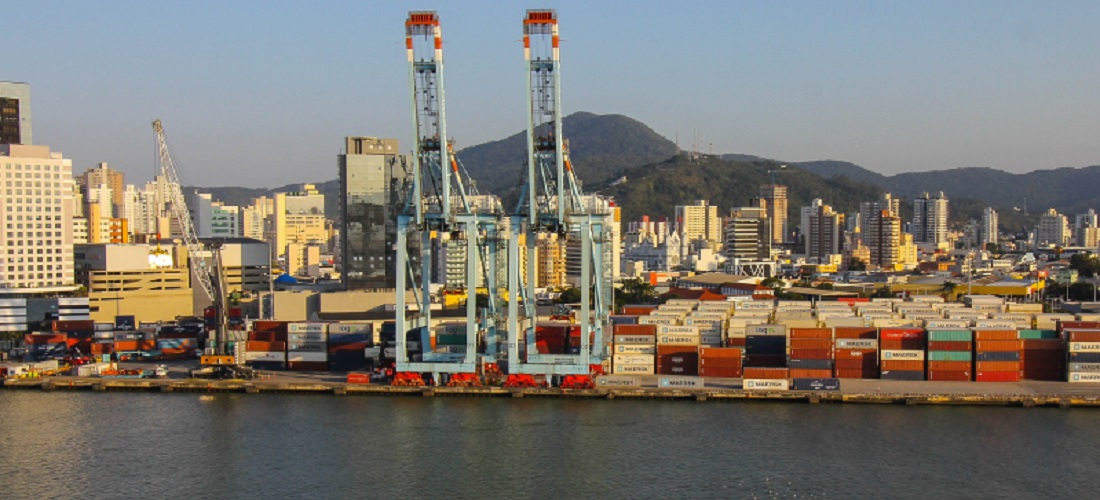
Why shipping giants may be kept from Port of Itajaí bidding
Sep, 19, 2022 Posted by Gabriel MalheirosWeek 202238
The largest container shipping companies in the world may be kept from bidding at the Port of Itajaí auction, which will change the Santa Catarina state maritime economic scene. The reason is a request from the Brazilian Association of Port Terminals (ABTP) to the country’s audit court TCU, asking to bar shipowners from the privatization process.
Currently, three of Santa Catarina’s five major ports are operated by international shipping giants. Portonave, in Navegantes, is managed by TIL, an MSC subsidiary. The ports of Itapoá and Itajaí are owned by APM Terminals, which belongs to the Danish company Maersk. Together, Maersk and MSC lead global shipping.
This was not the first time the Brazilian Association of Port Terminals has appealed to the TCU to contest the participation of shipping giants in the privatization auctions. Recently, the entity also questioned the involvement of shipowners in the concession of the STS 10 container terminal in the Port of Santos – and is still awaiting a response.
Preliminarily, the TCU assessed that Maersk and MSC could compete in Santos as long as they were not consortium members – which led the National Secretariat of Ports to include the same clause in the draft notice for the Port of Itajaí. But the Association thinks it is not enough.
Brazil has at least five major terminal operators that are not affiliated with shipping companies and are referred to as “white flag” terminals. Multinational corporations from China, the United Arab Emirates, Scotland, the Philippines, and Brazil are among them, and at least two have already expressed interest in the Port of Itajaí auction.
The impasse
ABTP claims that authorizing shipowners to compete in the auctions puts the sector at risk of substantial cost increases, such as freight adjustments, reduction and control of Brazilian shipping routes, and anti-competitive practices.
On the other hand, industry sources indicate that leaving the major global navigation players out of the competition has two effects: it immediately makes auctions less competitive. Second, it poses a risk of reducing the efficiency of container terminals in the medium term.
The argument in favor of vertical terminals, the ones operated by shipowners, is that they become more efficient because companies are directly affected by the loss resulting from delays in the logistics chain – for every day a vessel gets stuck at port queue results in a loss of US$ 120,000. There is pressure from shareholders of vertical terminals to prevent bottlenecks, which is not the case with white flag terminals, which profit from the fees generated by stopped cargo.
The figures for Santa Catarina, which proportionally has the largest number of vertical ports in the country, favor the shipowners’ version. The state has the best port efficiency indices in Brazil.
The impasse raised a red flag in the port chain and reached the Legislature in Itajaí. The councilors approved a motion of repudiation against the request of the Brazilian Association of Port Terminals to the TCU. The document was proposed by councilor Beto Cunha and unanimously approved.
Source: NSC
To read the full original article, please go to: https://www.nsctotal.com.br/colunistas/dagmara-spautz/como-as-gigantes-mundiais-de-navegacao-podem-ser-barradas-no-porto-de
-
Ports and Terminals
Oct, 16, 2024
0
Portos do Paraná Holds Public Hearing on PAR25 Lease Auction
-
Ports and Terminals
Sep, 10, 2024
0
Tax Auditors at Port of Santos Delay Imports and Threaten to Strike
-
Ports and Terminals
Dec, 15, 2020
0
Montevideo access channel to be dredged to 14m in 2021
-
Ports and Terminals
Sep, 21, 2021
0
Four public ports could be privatized by the end of 2022

